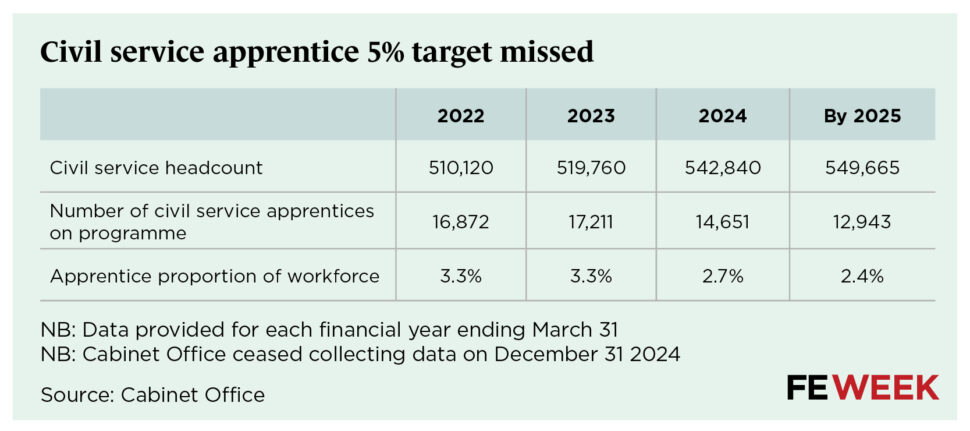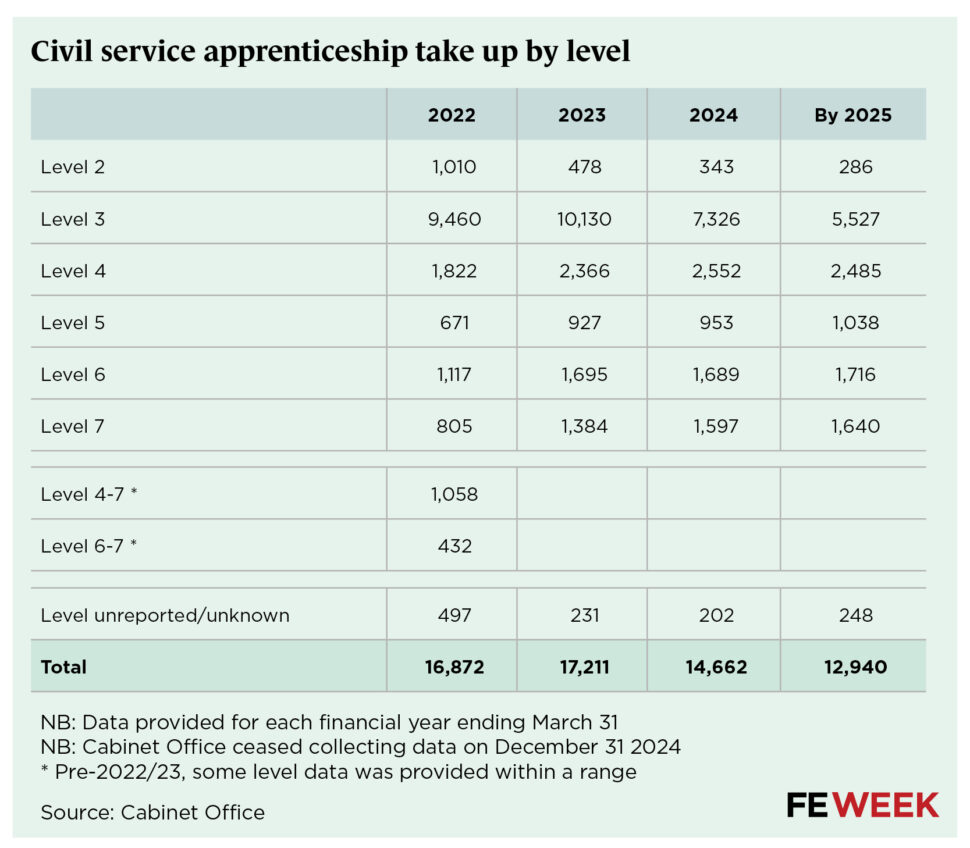A target for boosting apprenticeship numbers in the civil service has been missed by more than half, figures reveal.
Data obtained by FE Week shows just 2.4 per cent of the UK civil service workforce were apprentices by 2025 – way below the original 5 per cent commitment.
Conservative ministers, who set the target in 2022, pledged that one in 20 civil servants would be apprentices by 2025 in a bid to “diversify the pipeline of talent into government”.
But only around 13,000 apprentices were employed across the civil service’s 550,000-strong workforce by January – far short of the 27,750 required to meet the goal.
The figures, revealed through a freedom of information request (FOI), also show a benchmark requiring nearly four in 10 apprentices come from lower socio-economic backgrounds was missed.
Experts suggest that hiring freezes, a lack of career development structures and problems with releasing apprentices for off-the-job training have impeded civil service apprenticeship take-up.
Numbers fall year on year
The Cabinet Office provided an annual breakdown of apprentices per government department from the 2022 financial year to the end of 2024, when it stopped collecting data.
Apprentices accounted for 3.3 per cent of the civil service in 2022, totalling around 16,900.
The proportion remained flat in 2023 – with headcount of apprentices rising only slightly to 17,211 – but dropped to 2.7 per cent with 14,651 apprentices in 2024.
By the end of 2024, just 2.4 per cent (12,943) of civil servants were on an apprenticeship programme.
The drop could have been caused by a civil service numbers cap announced by then chancellor Jeremy Hunt in October 2023, which sought to save £1 billion by March 2025.
Hays UK & Ireland, a civil service recruiter, said it was “understandable” that targets were missed.
“Budget constraints, hiring freezes and operational demands often make it difficult to commit to structured training or release apprentices for learning time,” Matthew Lewis, the firm’s public services director, told FE Week.
A Cabinet Office spokesperson said: “These figures are largely from the previous administration, and this government remains committed to apprenticeships as a vital pathway for developing the skilled workforce the civil service needs to deliver national renewal.”

‘Elitist Britain’
The government was also unsuccessful in meeting the Social Mobility Commission’s national benchmark for having 39 per cent of the workforce from a lower socio-economic background.
Representation of working-class civil servant apprentices remained largely unchanged over the last four years. They made up 36 per cent of the apprentice workforce for all four years of data provided, aside from 2024 when representation dipped one percentage point.
Popular government graduate schemes such as the “fast stream” have attempted to improve socio-economic representation through blind recruitment measures, but privately educated people are twice as likely to be accepted onto schemes, according to the Sutton Trust’s recent Elitist Britain report.
In August, applications opened for a new level 3 civil service career launch apprenticeship for people who “haven’t followed traditional academic routes”.
The scheme will enrol apprentices on the business administrator standard and will place them in government departments around the country.
But union representatives said improving social mobility in the civil service was not enough – apprentices need “support once they get here”.
Deri Bevan, head of organising and learning at FDA union, which represents 24,000 civil servants, said: “Many apprentices struggle to find opportunities or resources to progress their careers within the civil service, often finding the career development structures and frameworks too difficult to navigate.”
The FOI data shows the civil service apprenticeship decline was driven by falls in level 2 and 3 apprentices over the last four years. At its peak in 2023, there were over 10,000 level 3 apprentices in the civil service, which almost halved to 5,527 by 2025.
Lewis agreed government employers should “embed” apprenticeships more strategically, not just as entry-level roles.
The figures suggest the government aimed to upskill civil servants through higher-level apprenticeships as the number on level 5 and 6 programmes grew by more than 50 per cent between 2022 and 2025. Meanwhile, the number of level 7 civil service apprentices more than doubled from 805 in 2022 to 1,640.
The government will remove level 7 apprenticeships from public funding for people aged 22 and older from January.

Treasury tops apprenticeship league
The Cabinet Office also provided a departmental breakdown of apprentices, showing HM Treasury was the biggest recruiter with 8.2 per cent of its 2,720-workforce in January being apprentices. At the Department for Education, 5.4 per cent of its 8,185 staff were apprentices.
Ofgem and the Food Standards Agency (FSA) had the lowest proportion, both achieving under 1 per cent. The FSA had 12 apprentices across levels 4 to 7 and recently advertised for two level 3 roles, taking its proportion to 0.9 per cent.
It recruits and trains between 20 to 30 meat inspectors annually and said it looked at apprenticeship pathways for the role, but no suitable option exists in the national apprenticeship framework.
Ofgem had 17 apprentices on programmes in digital, data engineering and economics, 0.8 per cent of its staff cohort, but is working to offer a programme in project management.
The Cabinet Office’s spokesperson said: “Since the collection of this data, we have launched a new cross-government apprenticeship programme to create more opportunities for young people across the country to access quality employment, particularly those who haven’t followed traditional academic routes.
“More broadly, we are committed to giving young people the skills they need to thrive in tomorrow’s job market, including through apprenticeships, which is why we will ensure that at least 10 per cent of young people pursue higher technical education or apprenticeships by age 25 by 2040, a near doubling of today’s figure.”
















This isn’t a surprise. The UK civil service happily promotes its successful in areas such as race and gender equality but dig deeper and the record on social mobility is appalling. It’s a service run by incompetent stale, pale, males from fee paying schools who’s ineptitude is covered by the efforts and creativity of the state school administrative core. This needs to change, especially in the age of AI where traditional thinking and hierarchies are a hindrance.
Total apprentices in a gov’t department does not mean the total of apprentices being hired. My hunch is most of these ‘apprentices’ in HMT and DfE are existing staff who are upskilling through an apprenticeship, which will do nothing to move the dial on the social composition of the civil service. Published data at the current time makes it very hard to ascertain whether an ‘apprentice’ is a new hire or an existing hire in an organisation.